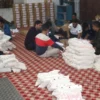Narayan Prasad Ghimire, Kathmandu, Dec 1: To begin with, some news headlines: ‘Effluent pollutes Ramgram’, ‘National bamboo conference in Diktel’, ‘LDCs find COP29 outcome watered down again’, and ‘Strong demand to raise concern over plastic pollution in Busan’.
Irrespective of the geographies and strengths, all countries across the globe have agreed that pollution, biodiversity loss, and climate change are triple planetary crises.
When it comes to these three crises plaguing the earth, thereby posing an existential threat to the humanity, the above news headlines warrant study and analyses. Whether the news and events on environment and climate change come from local, national or international forums, they bear much significance as all of us are in utmost need of collaboration to cope up the crises.
Yes, the first news explained how the industries emanating wastewater were polluting Ramgram and vicinity of Nawalparasi Purba district of Nepal. The effluent was emptied in local rivulet, which badly contaminated water for livestock and took toll on water animals and birds. Complaint was lodged at the related local government and District Administration Office. In response, the Chief District Officer was said to have assured of all sides gathering to resolve the problem.
The news was the example that local authority was lax on reigning in the industries run in the district despite posing serious threat. The industries were shirking their responsibilities towards public. It is high time the ‘polluters pay principle’ got enforced effectively.
Similarly, the news on national bamboo conference comes from Khotang, a hilly district in east Nepal. As per the story, Diktel Rupakot Majhuwagadi municipality of Khotang and Green Bamboo Creation, Lalitpur have decided to jointly organize a national conference on bamboo.
The event to be organized from February 27 to 29, 2025, is said be the first of its kind in Nepal. The organizers shared the information that conference was aimed at creating atmosphere favourable to utilize the bamboo that help generate jobs locally.
In response to RSS’ query, municipality Mayor Tirtha Raj Bhattarai said since the new representatives including himself assumed office, the municipality adopted a policy to capitalize the locally available resources, thereby fostering entrepreneurship and utilizing and transferring indigenous skills.
Dignitaries to be gifted bamboo chairs
He even informed that the dignitaries, including the President, the Prime Minister and the Speaker, were being sent gifts of bamboo products to make the municipality’s initiative wider and visible.
On to the next news, the least developed countries (LDCs) were betrayed by the developed countries in the recently concluded COP29, the annual UN climate event which was held in Baku city of a Eurasian country, Azerbaijan. The mega event held from November 11- 22 witnessed intense debates and discussions on how the world could reduce the greenhouse gases (GHGs) and the vulnerable countries, including LDCs and small island countries, be ensured larger amount as part of climate finance by the developed ones, which are historically responsible for heating the earth. But, the developed countries dampened their LDCs’ hope.
LDCs decried the COP29 declaration as: ‘Ambition is absent – The NCQG falls woefully short of addressing the climate emergency’s scale and urgency; the most vulnerable excluded; Loss and Damage dismissed; access denied; undefined climate finance, established mechanisms sidelined.’
It shows the vulnerable ones’ voices and plights were flatly ignored by the bigwigs, the industrialized and rich nations. However, Nepal, a member in the LDCs, returned home with little hope of assistance that some countries committed to extend support in its climate action.
Similarly, at a time when an event on international plastic treaty was going on in Busan city of South Korea, the concerned stakeholders in Nepal also urged for making agreement against toxic plastic. Till the writing of this news commentary, the participants in the event are zeroing in on the measures to curb plastic production.
Pay heed to local initiatives
When Nepal is facing the glocal challenge of pollution, biodiversity degradation and climate change impacts, the small but meaningful initiatives at local level must be heard, and support extended on time. It is urgency to go green and build a circular economy that highly encourages use, reuse, recycle and refurbish of the products.
The concept of minimum or no waste is advanced by the circular economy. The encouragement to use bamboo products is a significant step to discourage and ditch the use of plastic, a toxic product. Plastic has not only jeopardized human health but also polluted land and water, killing many organisms.
It is worrying that we have continued a reckless use of plastic, while there are several alternatives to replace it. The bamboo which is found in many places of Nepal can be used to replace numerous plastic items. Many household appliances can be made- that too at local level by using indigenous skills and knowledge- with the use of bamboo, which is ignored and left unused in the wake of overdependence on plastic for sheer convenience and luxury.
The bamboo is such a multi-purpose tree that can be used for fodder to livestock to furniture at homes and offices. Interestingly, when the present people’s representatives assumed office in Diktel Rupakot Majhuwagadhi municipality, they removed the furniture used by erstwhile representatives and set up the offices with bamboo products- chair, table and even cupboard.
Although Nepal has drawn world’s attention towards it plight in the face of climate change attending every international events including the COP, the local level schemes like that of Khotang cannot be belittled at all. We are cognizant that actions speak louder than words.
Use of indigenous skills
When effective climate diplomacy and negotiation can help bring in finance, our domestic homework on climate actions should also go together. To this end, the local level’s decision counts much. But lone efforts of local level are drop in the ocean while we are still using huge amount of plastics and importing the furniture. Empowerment of local level by collaborating with them is essential for launching the initiatives that protect environment, and contribute to sustainable development. Such activities further prop up the use and transfer of traditional indigenous skills and knowledge, which are on the verge of extinction in the wake of crass modernization.





